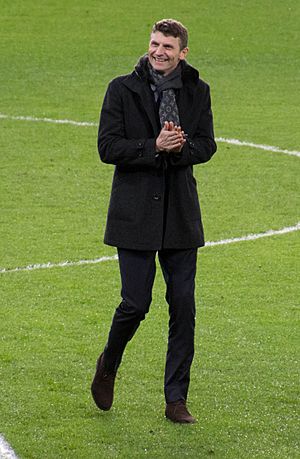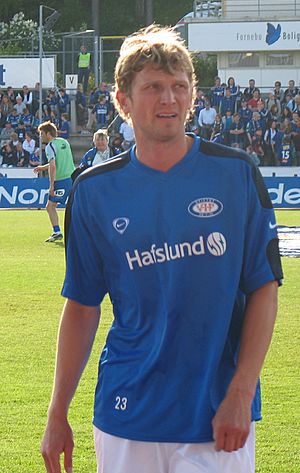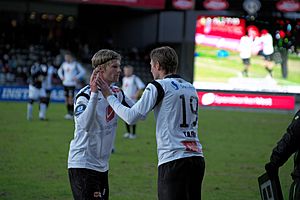Tore André Flo facts for kids

Flo in 2018
|
|||
| Personal information | |||
|---|---|---|---|
| Date of birth | 15 June 1973 | ||
| Place of birth | Flo, Stryn Municipality, Norway | ||
| Height | 1.93 m (6 ft 4 in) | ||
| Position(s) | Forward | ||
| Team information | |||
|
Current team
|
Norway youth (manager) | ||
| Youth career | |||
| Stryn | |||
| Senior career* | |||
| Years | Team | Apps | (Gls) |
| 1993–1994 | Sogndal | 44 | (21) |
| 1995 | Tromsø | 26 | (18) |
| 1996–1997 | Brann | 40 | (28) |
| 1997–2000 | Chelsea | 112 | (50) |
| 2000–2002 | Rangers | 53 | (29) |
| 2002–2003 | Sunderland | 29 | (4) |
| 2003–2005 | Siena | 63 | (13) |
| 2005–2006 | Vålerenga | 24 | (4) |
| 2007–2008 | Leeds United | 23 | (4) |
| 2008–2009 | Milton Keynes Dons | 13 | (0) |
| 2011–2012 | Sogndal | 22 | (2) |
| Total | 449 | (173) | |
| International career | |||
| 1995–2004 | Norway | 76 | (23) |
| Managerial career | |||
| 2022–2024 | Sogndal | ||
| 2025– | Norway youth | ||
| *Club domestic league appearances and goals | |||
Tore André Flo (born June 15, 1973) is a Norwegian football coach and a former striker. He used to be the manager of the club Sogndal.
He played 76 games for the Norway national team and scored 23 goals. He played for his country in the 1998 FIFA World Cup and UEFA Euro 2000. Flo scored Norway's first goal when they won 2–1 against Brazil in the 1998 World Cup. This win helped Norway move to the second round of the tournament.
During his career, he played for several clubs. These included Sogndal, Tromsø, and Brann in Norway. He then moved to England to play for Chelsea. After playing well there, he was sold to Rangers for £12 million. This made him the most expensive Norwegian player at that time. Flo also played for Sunderland, Siena, Vålerenga, and Leeds United. He announced his retirement in March 2008. However, he came back to play twice more. First for Milton Keynes Dons in November 2008, and then for Sogndal in March 2011. He retired for the third time in August 2012. After that, he joined Chelsea's coaching staff.
Contents
Flo's Early Life
Tore André Flo grew up in the village of Flo in Norway. He comes from a family where many people played football.
Flo's Club Football Journey
Starting at Sogndal
Flo began his football journey with his local amateur club, Stryn. In 1993, he joined Sogndal. He played there with his brothers, Jostein and Jarle. Tore André Flo played his first game in the top Norwegian league, Tippeligaen, on April 17, 1994. This was against Tromsø. When Sogndal moved down to a lower league in 1994, Flo moved to Tromsø.
Success at Tromsø
Flo became very successful at Tromsø. He scored 18 goals in the 1995 season, making him the club's top scorer. His great playing that season led to him playing for the Norwegian national team for the first time.
Playing for Brann
In 1996, Flo moved to Bergen to play for Brann. He continued to play well, scoring 28 goals during his time there. Many people thought Flo became one of Norway's best attackers while at Brann.
In early 1997, some Brann fans were not happy with his performance. This might have been because he had already signed with Chelsea. However, he scored three goals in his last game for Brann before leaving for Chelsea.
Time at Chelsea
Chelsea, an English Premier League team, bought Flo for £300,000 in the summer of 1997.
Flo played his first game for Chelsea against Coventry City. He scored a goal, but Chelsea lost 3–2. In his first season, he scored 15 goals for Chelsea. This included three goals in a 6–1 win against Tottenham Hotspur. He also scored two goals in a 6–2 win over Crystal Palace. Chelsea finished 4th in the Premier League that season. They also won the League Cup and the Cup Winners' Cup. Flo helped a lot in the Cup Winners' Cup. He scored two important goals against Real Betis in the quarter-finals.
A year later, Chelsea was trying to win the league title. Flo scored ten league goals. But the manager, Gianluca Vialli, often changed the players. Also, Chelsea signed another striker, Pierluigi Casiraghi. This meant Flo did not always get to play. Chelsea finished third, which was good enough to play in the UEFA Champions League for the first time. In the 1999–00 season, Flo scored 19 goals. He was Chelsea's top scorer. He helped the club win the FA Cup. They also reached the Champions League quarter-finals. He scored two goals in a 3–1 win against Barcelona at Stamford Bridge. He scored another goal in the return game against Barcelona. Chelsea lost that game 5–1 after extra time.
By the start of the 2000–01 season, Chelsea signed new strikers. These were Jimmy Floyd Hasselbaink and Eiður Guðjohnsen. Even though Flo scored two goals and helped with another in a 3–3 game against Manchester United, he was often on the bench. So, he asked to leave the club. He played 163 games for Chelsea and scored 50 goals.
Moving to Rangers
In November 2000, Flo was sold to Rangers, a team in the Scottish Premier League. This deal was worth £12 million. This made Flo the most expensive Norwegian player ever at that time. It was also Rangers' most expensive player signing.
People had high hopes for Flo at Rangers. He started well by scoring in his first game. This was a 5–1 win against Rangers' big rivals, Celtic. He scored 18 goals in 30 league games. His second season at Rangers was considered his best in Scotland. He scored 22 goals in 42 games. This included the first goal in the 2002 League Cup final win against Ayr United.
Playing for Sunderland
Flo was sold to Sunderland on the last day of the transfer period in 2002. He joined at the same time as another striker, Marcus Stewart. The total cost for both players was £10 million. Sunderland did not say how much they paid for Flo alone. But many news reports said it was £8.2 million. Sunderland later said they bought him for £6.75 million. This made him Sunderland's second most expensive player.
Flo scored in his first game for Sunderland. It was a 1–1 draw with Manchester United. Sunderland's manager, Peter Reid, wanted Flo to play like Niall Quinn, a tall striker who was retiring. Flo was not comfortable with this role. He also found it hard to play well with fellow striker Kevin Phillips. When Reid was fired in October, Flo did not play as much. The new manager, Howard Wilkinson, even questioned Flo's fitness. Flo worked hard to get back into the team. But when Wilkinson was fired in March, the next manager, Mick McCarthy, did not give Flo much playing time.
Flo played 33 games for Sunderland and scored only 6 goals. Sunderland was moved down to a lower league. The club had many debts and had to sell players who earned a lot of money. Flo played one League Cup game in 2003. In the autumn of 2003, he was allowed to leave Sunderland for free.
Time in Siena, Italy
Flo then went to Italy and joined Siena in 2003. Siena had just been promoted to the top league, Serie A. Flo played for Siena for two seasons. He became a successful player in Italian football. He helped the club stay in the top division for the first time. He showed he could play in different positions. The manager asked him to play as a second striker, behind other players. He did very well in this new role. He played in almost every game in the 2003–04 season. He scored eight goals, helping Siena avoid moving down a league. He scored his first goal for Siena against Empoli on September 20. He later scored the winning goal in a 1–0 home win against Udinese.
His second season with Siena was not as good. He had injuries and other strikers were competing for his spot. He played less under the new manager. He scored five goals in 17 starts during the 2004–05 season. He also played 5 games as a substitute. He still helped Siena avoid moving down a league. He scored the only goal in a historic 1–0 win against rivals Fiorentina. He also scored two goals in a 2–1 away win against Roma in the Coppa Italia. He scored two more goals in a 3–1 away win against Chievo. He also scored a goal in a 2–2 home game against Inter Milan.
Playing for Vålerenga

Flo signed with Vålerenga from Oslo in July 2005. His contract was until the end of the 2006 season. He had many injuries while at Vålerenga, which stopped him from playing his best. Vålerenga did not offer him a new contract after the season. This meant Flo could sign with any other club.
Time at Leeds United
On January 3, 2007, his former teammate Dennis Wise brought Flo back to England. He joined Leeds United. His contract lasted until the end of the 2006–07 season. Flo played his first away game for Leeds as a substitute. This was in Leeds' 3–1 loss to West Bromwich Albion in the FA Cup. A week later, Flo scored his first goal for Leeds against the same team. He scored with a header after three minutes in a league game, which Leeds lost 3–2.
Injuries stopped Flo from playing much for the rest of that season. Many thought Flo would leave Leeds because of a clause in his contract. But Leeds signed him for another year to help them in their 2007–08 season. He only scored 3 goals in the league that season, all as a substitute. Flo was sponsored by the famous Leeds fans, the Kaiser Chiefs. Flo had said that Leeds would probably be his last club before retiring. He became a favorite among fans, even without playing much.
In March 2008, Flo announced he was retiring from football.
Short Spell at Milton Keynes Dons
On November 21, 2008, Flo came out of retirement. He signed a contract with Milton Keynes Dons until the end of the season. He played his first game for MK Dons as a substitute on December 6, 2008. This was against Scunthorpe. He did not start a game until the third-to-last game of the season against Walsall. Flo also missed a penalty in a shootout against Scunthorpe United. This stopped MK Dons from reaching the 2009 League One play-off final.
On May 19, 2009, Flo's contract with Milton Keynes Dons ended.
Return to Sogndal
In 2011, two years after retiring, Flo made a surprising comeback. He returned to Sogndal, which had just been promoted. He first played as a substitute against Rosenborg on July 30. In his first game starting, on the last day of the season, he scored both goals in a 2–1 win against league champions Molde. That team was coached by Ole Gunnar Solskjær.
Flo's International Career
Flo played 76 games for the Norwegian national team. His first game was a 0–0 draw with England. He scored 23 goals, which makes him Norway's joint-4th highest goal scorer. He shares this spot with Ole Gunnar Solskjær. He was nicknamed Flonaldo (a fun name based on Ronaldo, a famous striker). This happened when Norway beat Brazil 4–2 in a friendly game. Flo played for Norway in the 1998 FIFA World Cup. He scored a goal in a 2–1 win over Brazil, who were the champions at the time. This helped Norway reach the second round. Flo decided to stop playing for the national team in 2004. He wanted to spend more time with his family.
How Flo Played Football
Flo was a fast, tall, strong, and powerful striker. He was good at scoring goals. He was known for his ability to head the ball well. Even though he was big, he also had good technical skills. He was able to play well with his teammates.
Flo's Coaching Career
After he stopped playing in 2012, Flo went back to his old club, Chelsea. He became a club ambassador and a coach in their Academy. He worked with their youth teams, often the Under-14s. Later, he became a coach for players on loan from Chelsea.
On November 17, 2021, Flo was announced as the new head coach of Sogndal in Norway. This was the club where he started and ended his playing career.
In February 2025, Flo was chosen to manage one of Norway's youth national teams. He is now in charge of either Norway U15, Norway U16, or Norway U17.
Flo's Family and Academy
Flo comes from a family of footballers. Seven members of his family have played in the top Norwegian league, Tippeligaen. His brother Jostein Flo and his cousin Håvard Flo also played for clubs abroad and for Norway. His brothers Kjell Rune Flo and Jarle Flo played for Molde and Sogndal. Kjell Rune's son Ulrik Flo and Håvard's nephew Per Egil Flo also played for Sogndal. Flo supports the football club Aston Villa.
Tore André Flo Academy
In 2010, Flo and football coach Sean Faulkner started a football academy in Berkshire, England. It teaches children aged 5 to 17 at schools, clubs, and holiday camps. Flo coaches some of these sessions himself.
Images for kids
See also
 In Spanish: Tore André Flo para niños
In Spanish: Tore André Flo para niños
 | Misty Copeland |
 | Raven Wilkinson |
 | Debra Austin |
 | Aesha Ash |





